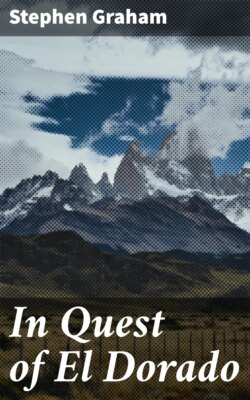Читать книгу In Quest of El Dorado - Stephen Graham - Страница 3
На сайте Литреса книга снята с продажи.
PREFACE
ОглавлениеTable of Contents
Having voyaged twice to America from British ports and once from Copenhagen, I determined on my fourth visit to approach America from Spain and try to follow Columbus's keel over the waters. This study of the quest of El Dorado is mostly on the trail of the Spaniards. The motive of the first explorers and pioneers was generally the quest of gold. And even to-day most people who seek America do so to make money, many to make a fortune. There is, therefore, a continuity through the centuries of the quest of fortune.
My wife and I took Spanish ship from Cadiz in Spain to the Indies; landing at Porto Rico, whence we visited in turn Haiti and Cuba. I saw San Salvador, the first land Columbus found, and was also in the Bahamas. We proceeded to New Orleans and then to Santa Fé in New Mexico. I visited Panama, however, alone and climbed a peak in Darien, to realize once more what it meant to Balboa when for the first time his eyes lighted on the Southern Sea. After the Panama exposition I was joined by Wilfrid Ewart and with him we followed out some of the fantastic adventures of Coronado, and it took us to the famous Shaleco Dance at the "center of the earth." With him my wife and I rode to Jemez, and later we visited Mexico, where, unfortunately, Wilfrid Ewart was killed by a stray shot on Old Year's night. In Mexico we followed the trail of Cortes, visiting the places which are most memorable in his conquest of Mexico. This took us to the ancient pyramids of the Anahuac plateau and to the ruins and buried cities of the South.
Throughout the descriptions and interpretations, endeavor is made to measure the quest for power and the quest of gold in all these countries and territories. I have not visited the republics south of Panama, but have confined myself to what an American general has called "the necklace of the Caribbean"—the potential American dominion of the future. The drive of events is making democratic America into an empire. An imperial rôle is almost unavoidable. I have not, however, thought it necessary either to criticize or approve imperialism. I have made an Odyssey and I tell what I saw, not as Ulysses would have told it, but as one of those who at many points was ready to eat the lotus and not too mindful of Ithaca and home.
My thanks are due to the New York Evening Post, which published many letters from far-off places, and to the American Legion Weekly, which, under the title of "Panama and Pan-America," published my essay on the Canal.
Stephen Graham
